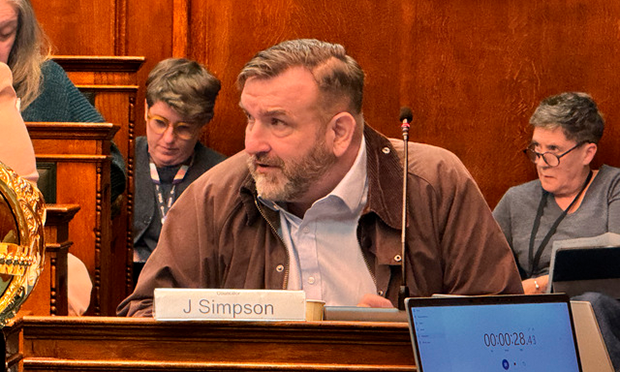Council moves forward with later hours plans for borough’s nightlife

Cllr Jonathan Simpson MBE. Photograph: Josef Steen / free for use by LDRS partners
Camden Council’s new licensing policy took a step further this week as members gave the green light to plans allowing venues to stay open later.
On Wednesday (30 April) the Town Hall’s licensing committee approved its draft five-year strategy for the borough, including plans to extend ‘framework hours’ for pubs, clubs and other businesses.
This would enable premises to potentially serve alcohol and hot food for an extra 30 minutes each day of the week.
The council has said its updated and “balanced” policy would help business growth “while encouraging greater community participation and increased confidence in licensing decisions”.
During the meeting, committee chair Cllr Jonathan Simpson (Labour, King’s Cross) thanked local residents for their “incredibly valuable engagement” throughout the process.
Cllr Sabrina Francis (Labour, Bloomsbury) stressed that the extra half-hour would be “an option, not an entitlement”, and that councillors would “always interrogate” applications.
She also seized the moment to champion the borough’s culture: “We are incredibly lucky to live where we are. Artists have shaped the world – all from our little patch of London.”
Under the proposed new rules, those business seeking to stay open later will need to conduct a risk assessment and introduce extra measures, such as dispersal policies or extra security, to prevent public disturbance.
The council has also added a raft of new policies since the consultation phase, including the expectation for premises to promote women’s safety initiatives, provide alcohol awareness training for staff, and adopt measures to avert drink-spiking.
But much to the chagrin of residents’ associations and councillors, cumulative impact zones (CIZ), which make it harder for businesses to obtain licences in areas already saturated with licensed venues, were scrapped.
Existing CIZs in Seven Dials and Camden Town were abandoned after council teams judged there was “insufficient evidence” that nightlife in these areas was undermining the borough’s licensing objectives.
Members were joined by representatives from Tenants and Residents Association Camden Town (TRACT), Charlotte Street Association (CSA) and Covent Garden Community Association (CGCA), all of whom were concerned by the draft policy.
Kathryn Gemmell from TRACT said her organisation welcomed some of the changes the Town Hall had made to the strategy since last year, which had “provided balance between the needs of residents and businesses”.
But she said locals remained “unhappy” about the council dropping the use of impact zones in Seven Dials and Camden Town.
She was supported by CGCA’s David Kaner, who argued that the council was missing an open goal of collecting its own data on the repercussions of nightlife.
“I’m confused by the fact that Camden councillors can walk down Charing Cross Road and through Camden Town at midnight on a Friday and Saturday and say there is no evidence of cumulative impact,” he said.
“Even your own community safety assessments said there was a big overlap between violence and the night-time economy, both in time and area.”
His scepticism around the policy change was shared by the council’s deputy leader, Cllr Patricia Callaghan (Labour, Camden Town), who wondered how the borough could be “confident” that there would be no cumulative impact from the licensing changes.
Council officers said the Town Hall was developing an app that would enable residents to collect information in the event of noise disturbance.
Public protection and licensing manager William Sasu said council teams had “ensured every area will be looked at based on its merit”, and that the plans allowed “anybody” to raise cumulative impact with the committee in future licensing decisions.
Conservative leader Cllr Steve Adams (Frognal) and Cllr Matthew Kirk (Lib Dem, Belsize) voted against the proposals.
Adams criticised the council’s “magical refutation of the concept of cumulative impact”, while Kirk exhorted officers to “give us a clue” as to how the local authority was going to “shoulder the burden of evidence – rather than putting it on the rest of society”.
The draft strategy is now set to go to cabinet and then to for a full council vote on adoption “in the future”, Cllr Simpson said.
